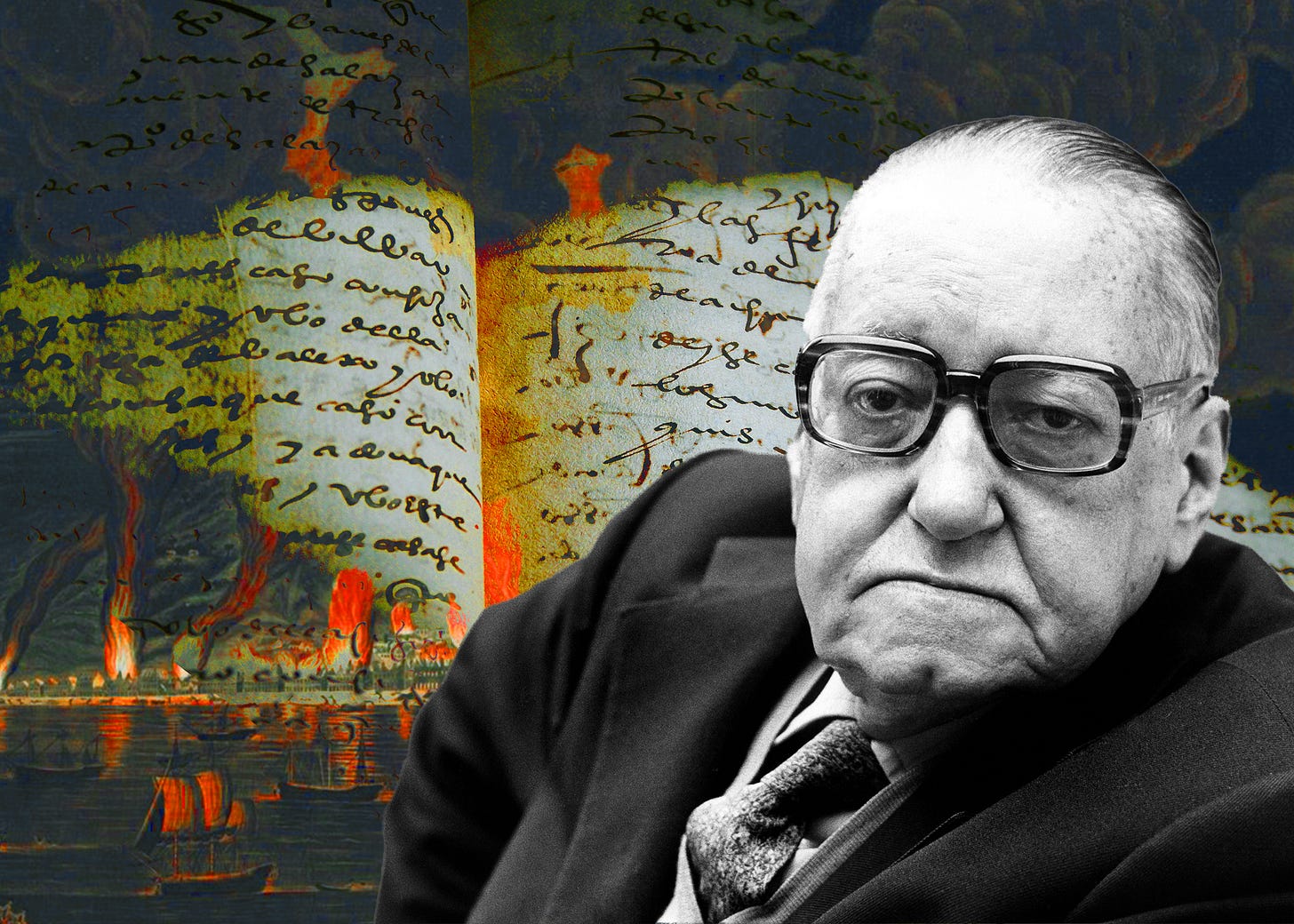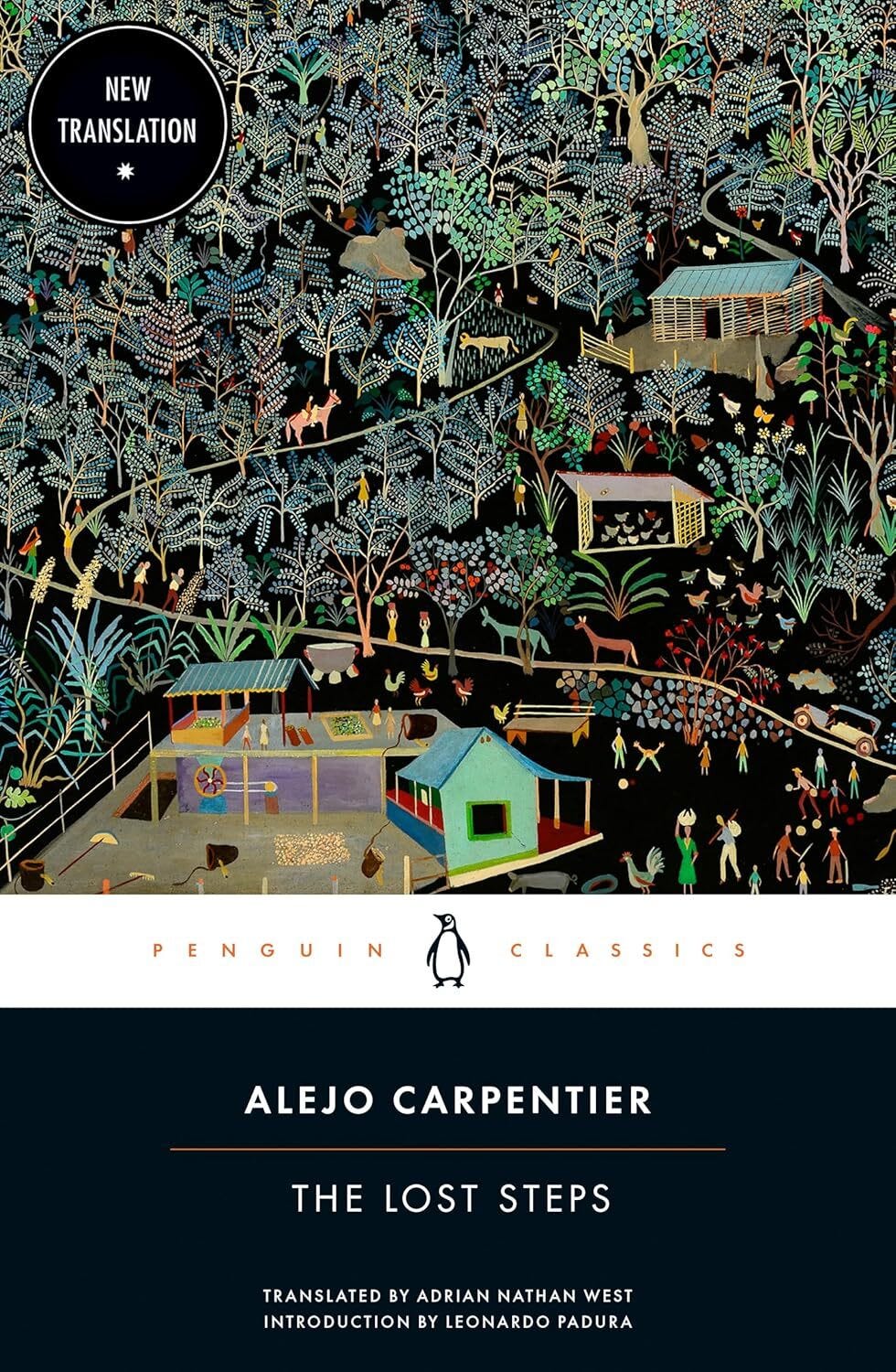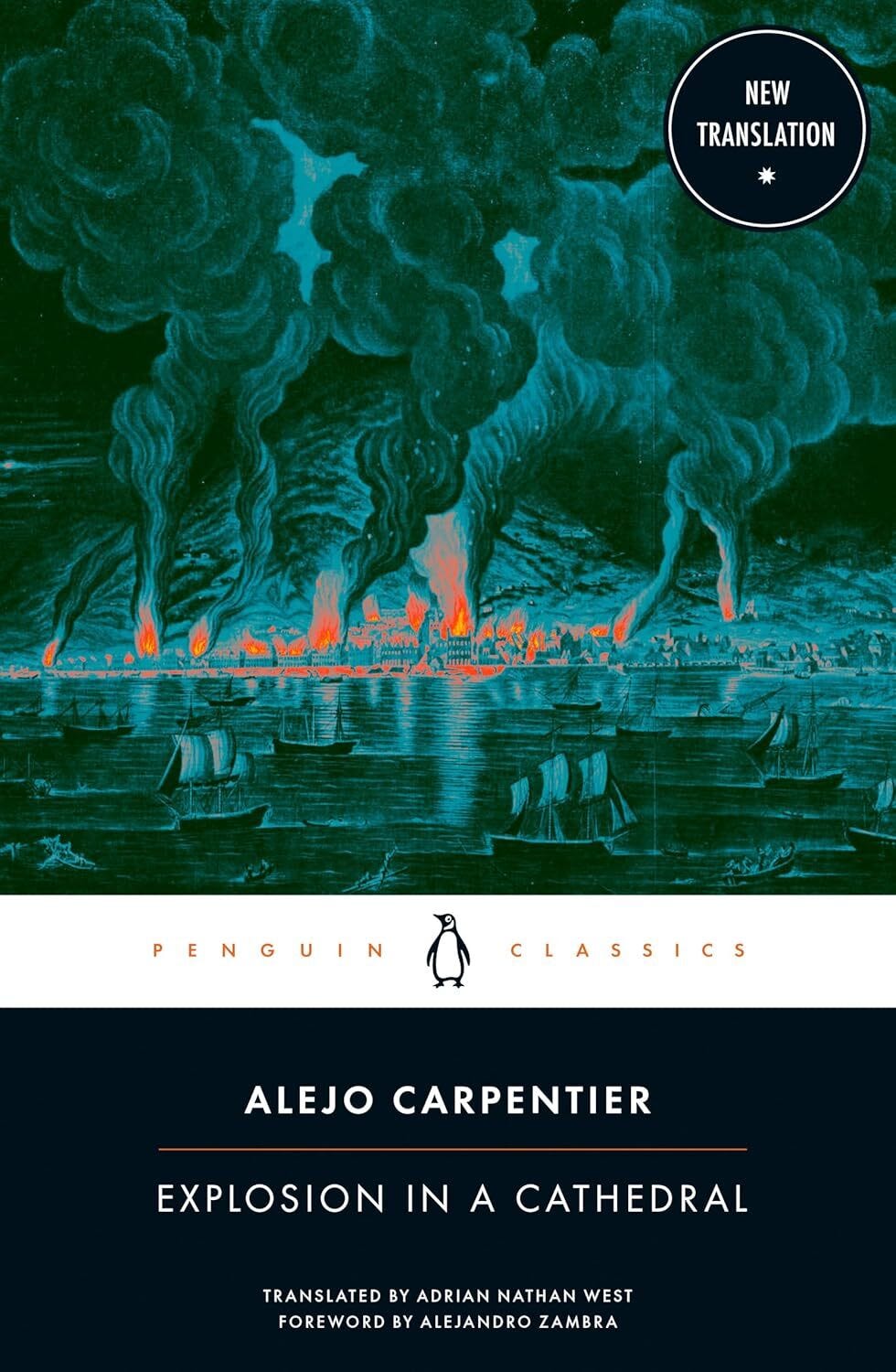Ancient Yearnings, Modern Terrors
New translations of novels by Alejo Carpentier portray the twin temptations of nostalgic renunciation and revolutionary violence.
The Lost Steps
by Alejo Carpentier
(trans. Adrian Nathan West)
Penguin, 226 pp. (paperback), $18
Explosion in a Cathedral
by Alejo Carpentier
(trans. Adrian Nathan West)
Penguin, 311 pp. (paperback), $18
AMONG MAJOR LATIN AMERICAN WRITERS of the last century, Alejo Carpentier (1904–1980) is perhaps the least known to readers in the United States. Born in Switzerland (evidently anyway, according to his birth certificate, though he always claimed Cuban birth) to a French father and a Russian mother, he arrived in Havana at 4 or 5 years old, bounced over to Paris four years later, and returned to Cuba at 16. His leftist politics made trouble for him there, and for long stretches he found refuge in France and Venezuela. Following Fidel Castro’s Communist revolution in 1959, Carpentier returned to Cuba, where he spent a few years working in the state-owned publishing industry. In the mid-1960s, Castro sent him to France as a cultural attaché to the Cuban embassy, and he lived out his days in Paris.
Carpentier’s two best-known novels have recently appeared in new translations by Adrian Nathan West. According to West, the previous English version of The Lost Steps (1953) flattened unconscionably the baroque and sometimes forbidding style of the original, and failed to capture Carpentier’s “ecstatic, abstruse lyricism.” Explosion in a Cathedral (completed in 1958 but not published until 1962) was first translated into English not from Carpentier’s own Spanish text but from a French translation. I don’t know Spanish and can’t judge West’s faithfulness, but the grace and energy of his versions are of a high standard. If you never before thought of lyricism as abstruse, here you have your initiation.
The Lost Steps follows the track of an eminently civilized but misdirected man—an unnamed composer and intellectual who labors ignominiously writing music for corporate advertising—as he leaves New York and his actress wife, and takes along his French mistress, for an excursion into the South American wilds. To atone for his debased craftsmanship and sullied vocation, he is hunting near the headwaters of the Orinoco for aboriginal musical instruments that he hopes will verify a theory of his about the primal beginnings of man’s highest art. He wants to find there a humanity more worthy of respect and honor not only than the crass citizens of commercial democracy but also of the most elevated modern types: the supreme artists. Beethoven’s Ninth Symphony, which represents for him the apex of liberal civilization, has come to seem the most telling confession of cultural impotence, “with its unkept promises, its messianic yearnings, capped off by the shooting gallery of Turkish music running riot in a nod to the masses in the prestissimo finale.” The emergence of fascism and the enormities it begot, to which Carpentier’s narrator was a witness, have ruined for good the all-embracing aspirations to sublimity of the Ode to Joy. Perhaps the human denizens of the jungles will prove morally estimable as their putative superiors, the world-conquering, heaven-storming white race, emphatically failed to do. And perhaps a man weary of the botched modern world will find his rightful life in a place both a few hours and many thousand years distant from his customary habitat.
As this is a novel and not an anthropological monograph, such a life would naturally include a lovely woman like no other the hero had ever known: Enter Rosario, a local woman who replaces his ever so knowing and increasingly annoying French mistress when the latter falls ill and must leave the expedition. Rosario is not nearly as primitive as the pure-blooded Indians of the deepest jungle who so fascinate the narrator, but she is close enough to entice him with her strangeness, her novelty. Here she is, washing his clothes in the stream:
The way she knelt by the water, her hair hanging loose, holding a bone to scrub with, her profile took on an ancestral aspect that made her closer to the women from here than those whose blood had lightened her skin across generations. . . . She emanated the mystery of a remote world whose light and time I knew nothing of.
It costs him some effort, some “intellectual concessions,” to accommodate himself to her lack of a modern mind and sensibility:
For her, I’m not so different from the other men she’s known, whereas in order to love her—and I do believe I love her deeply—I’ve had to adopt an entirely new scale of values concerning the bonds between a man of my education and upbringing and a woman who is all woman and yet a woman and nothing more.
Despite such complications, and the potential for both tragedy and farce that the narrator’s solemn earnestness contains, his life is far simpler, more authentic, and more agreeable in the wilderness. To remain there would mean not only a new lover but also a renewed resolve to compose real music again: He even begins sketching the beginnings of a cantata on Shelley’s Prometheus Unbound. In the end he must decide which woman and which way of life he will devote himself to. And there will be eventualities he may not have reckoned with in making up his divided modern mind. Carpentier gives the decision and its consequences the moral weight a fateful existential choice by a serious man deserves. The Lost Steps is a product of the ever grave philosophical world of Sartre, Camus, and Lévi-Strauss, and any inclination the reader might have had to laugh or shake his head knowingly at some of the hero’s primordial enthusiasms is mostly forgotten as the novel comes to a close.
Politically, Carpentier might appear at first glance more like the unrepentant Stalinist Sartre than the liberal Camus. Nothing makes an artist more suspect than being the darling of such a brute as Castro. However, Carpentier’s best-known novels, which antedate his return to Cuba, question heatedly the integrity of revolutions and the decency of the men who make them. Before the narrator of The Lost Steps enters the jungle, he has a layover in Caracas, where revolutionary guerrillas roam the streets, spraying gunfire everywhere. A bullet kills a German guest conductor for the symphony who makes the mistake of looking out the hotel window when he hears the commotion outside: Carpentier’s way of teaching the vulnerability of artistic beauty amid political tumult commanded by the men out to change the world with guns.
EXPLOSION IN A CATHEDRAL TAKES AS ITS GREAT THEME revolution and its inevitable corruption by fervent true believers convinced they are executing history’s imperatives—specifically, the French Revolution as exported to the Caribbean, where the promise of equality and freedom entails the terrifying dominion of the guillotine, and the terror eventually annuls the promise.
The novel traces the great revolutionary romance through the stages of corrosion and to its eventual dissolution. An alluring stranger from afar arrives late one night and awakens the somnolent Havana household of three recently orphaned adolescents, Esteban, Carlos, and Sofía. This stranger is Victor Hugues, who offers the seductive mental excitements of rebellion against the hidebound pieties of the old regime to the pliable Esteban; this irresistible intellectual daring of Victor’s leaves the impressionable Sofía aflame with first love. Both young people become Victor’s followers as he rises through the revolutionary ranks to earn the dubious honorific the “Robespierre of the Islands”:
In that part of the globe, the commander had come to embody a kind of unipersonal government, autonomous and independent, thus realizing to an astonishing degree his unconfessable aspiration to make himself one with the Incorruptible. He had wanted to be Robespierre, and he was a Robespierre in his way. Like Robespierre in other days, who had spoken of his government, his army, his squadron, Victor Hugues spoke now of his government, his army, his squadron. His erstwhile arrogance restored, the Plenipotentiary conceded himself, at the hour of chess and card games, the role of One and Only Perpetuator of the Revolution.
Of course, the Revolution is known for eating its own, and makes a meal of its One and Only Perpetuators.
The Spanish title of Explosion in a Cathedral is El siglo de las luces—literally “The Century of Light,” a phrase that is common parlance for the Enlightenment, the Age of Reason. Carpentier’s is an essentially conservative critique of Enlightenment aspirations. What drives his characters infected with the spirit of the revolutionary age is the irrational faith in reason—and especially in the irrefutable rightness of their own thinking. Rampant bloodshed is justified by eerily bloodless ratiocination. The very look of the guillotine suggests the embodiment of a geometry lesson: “The Machine was still cloaked on the prow, reduced to one horizontal and one vertical plane, bare like the outlines of a theorem….”
When the French revolutionaries trash that old-time religion and institute the cult of the Supreme Being, Who is comprehensible to all men by reason alone, the upshot is a grossly swollen self-regard for the powers of their own minds; rank atheism would have been less destructive. Esteban, who becomes an apostate from the revolutionary faith, reflects on the failure of this political religion: “He thought suddenly that the weakness of the Revolution, which had deafened the world with shouts of a new Dies Irae, lay in its lack of valid gods. The Supreme Being was a god without history. He had not produced a Moses of such grandeur that he could hear the words of the Burning Bush, building an alliance between the Eternal and his chosen tribes. The Supreme Being had not been made flesh and had not dwelled among us. Sanctity was lacking in the ceremonies celebrated in his honor.” Most men need something more of their God than the elegant cerebral emanations that philosophes intoxicated with their own brainpower can provide.
Slovenly reality resists the austere programs proposed by the idolaters of the human mind’s perfection. The ruck and riot of political life, with uncontrollable passions pressing from all sides, are a far cry from the theoretical beauties spun by the finest thinkers of the time. Politics means perennial disorder: The process of ruling multitudes on opposite sides of the world—the metropolitan center and the colonial periphery—is necessarily “inconsistent, self-devouring, prone to fits, complicated by committees and mechanisms that could hardly be grasped from afar, with news constantly arriving of unexpected developments, of the rise of unknown personages or the treacherous fall of some notable who only yesterday drew comparison with the great statesmen of ancient days.”
Like a bloody-minded youth focusing the rays of the midday sun through a magnifying glass, Carpentier incinerates some of the boldest revolutionary notables as though they were noisome insects. Such heroism as theirs converts all too readily into villainy. Equality, justice, freedom, and honor are easily befouled and tend to become lethal delusions. The higher you rise, the more power you wield, the likelier you will betray your original ideals. The direst error is to confuse the inexplicable accidents and contingencies of your life with your personal destiny or with historical inevitability. To elude the grip of modern political life appears to offer the only chance men and women have of living honestly and happily.
Could Fidel Castro have read this novel and failed to recognize himself in Victor Hugues or some other august personage? Did Castro hustle the distinguished author off to Paris in order to eliminate the danger he’d pose if he stayed in Havana? Or could Carpentier have exempted Castro from his wholesale condemnation of the vicious revolutionary crew? Does Carpentier’s devastating critique perhaps pertain only to the bourgeois revolutions, not to the millennialist uprisings of proletarians and peasants? More than a vital antidote to political folly, Explosion in a Cathedral is remarkable for its intelligence conjoined with the tragic sense of life, a bleak masterpiece that rightfully stands alongside the works of Joseph Conrad and V.S. Naipaul, and is far superior to the much more famous fantasies of that other Castro favorite, Gabriel Garcia Márquez.






